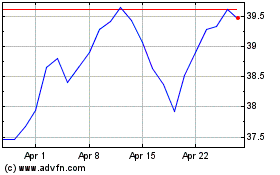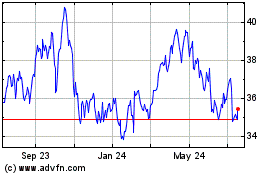By Christopher Whittall
LONDON -- Investors are now paying for the privilege of lending
their money to companies, a fresh sign of how aggressive
central-bank policy is upending conventional patterns in
finance.
German consumer-products company Henkel AG and French drugmaker
Sanofi SA each sold no-interest bonds at a premium to their face
value Tuesday. That means investors are paying more for the bonds
than they will get back when the bonds mature in the next few
years.
A number of governments already have been able to issue bonds at
negative yields this year. But it is a rare feat for companies,
which also ask investors to bear credit risk.
The move has been driven by the European Central Bank's
expansion this summer of its bond-buying program from government to
corporate debt, creating more demand for bonds and pushing down
their yields. But even if the pricing is explainable, some
investors are still trying to come to terms with the idea.
"We're trying to get our heads around it," Edward Farley, head
of European corporate bonds at PGIM Fixed Income, said of Tuesday's
deals. "It seems pretty bizarre to ask a corporate to look after
your money and give you back less in two to three years' time."
It may seem counterintuitive to buy bonds at a price that
guarantees a loss going in. But investors have limited options
given even deeper negative yields on much government debt and the
costs of holding cash. Some may be betting that central-bank buying
will drive prices even higher, letting them sell the bonds for a
profit before they mature. Others may be required to invest in
certain types of bonds.
Henkel, maker of Persil detergent and Loctite caulks, sold a
EUR500 million ($558 million) bond that matures in two years, while
Sanofi, an international pharmaceuticals company, sold a EUR1
billion bond that comes due in January 2020, according to deal
notices released to investors. Both deals will put buyers only
narrowly in the red -- they each priced with a yield of minus-0.05%
-- and both were part of larger packages that included bonds with
low but positive yields, the notices said.
"With interest rates reaching record lows, we decided to be
opportunistic," a spokeswoman at Sanofi said.
Henkel declined to comment.
Yields on corporate debt have plunged in recent months as
investors have pushed up prices in the scramble for returns.
Roughly EUR706 billion of eurozone investment-grade corporate bonds
traded at negative yields as of Sept. 5, or over 30% of the entire
market, according to trading platform Tradeweb, up from roughly 5%
of the market in early January.
Tuesday's deals, however, are among just a handful of corporate
offerings that have actually been sold at negative yields. They
include offerings of euro-denominated bonds earlier this year by
units of British oil giant BP PLC and German auto maker BMW AG,
according to Dealogic. Germany's state rail operator, Deutsche Bahn
AG, also has issued euro-denominated bonds at negative yields.
The ECB launched its corporate bond-buying program in early June
and had bought over EUR20 billion of corporate bonds as of Sep. 2.
Most of its purchases came in secondary markets, where investors
buy and sell already issued bonds. The central bank meets Thursday
and will decide if it should expand its current bond-buying
program.
The purchases have helped set off a burst of issuance following
the traditional summer lull in local capital markets. Last month
was the busiest August on record for new issuance of
euro-denominated, investment grade corporate debt, according to
Dealogic.
Also on Tuesday, commodities group Glencore PLC sold about EUR1
billion in bonds in one of its first forays into capital markets
since its shares and bonds were sold off last fall amid concerns
over debt levels and falling commodity prices. Glencore said it
would use the proceeds to pay down debt.
Central banks around the world have adopted increasingly
aggressive efforts to boost weak economic growth. A number have
pushed their benchmark interest rates into negative territory.
Others have bought government bonds to pull down interest rates.
The ECB is buying corporate bonds as well, while the Bank of
England is expected to start its own purchases of such securities
in mid-September.
It isn't clear that the approach is working; ECB President Mario
Draghi said in July that the bank had seen a continued increase in
demand for loans from companies and households during the second
quarter, as ECB policy significantly improved borrowing conditions.
Yet while companies are raising more money, analysts believe they
are sitting on much of it or using it to refinance more expensive
debt.
The ECB's latest survey of bank lending in the euro area,
published on July 19, found that companies were borrowing more to
take advantage of low interest rates, to pay down debt and build up
inventories or working capital, and to carry out deals. But the
number of companies borrowing to make fixed investments slid
further in the second quarter, the survey found.
Nonfinancial corporations in Europe, the Middle East and Africa
had EUR921 billion in cash balances as of December, according to a
report from Moody's Investors Service on the companies it rates, up
about 5% from a year earlier.
Many companies are holding back from spending for the very
reason that central banks are launching their stimulus: poor
economic prospects.
"Companies need a compelling argument to expand their
businesses, either through investment or acquisition, based on an
upbeat economic outlook and limited risks in the near term," said
Zoso Davies, a credit strategist at Barclays PLC.
Some economists believe measures like negative interest rates
may spur greater caution on the part of businesses and consumers by
expressing central-bank fear over the economic outlook.
Meanwhile, investors are faced with portfolios of
negative-yielding bonds and pension funds with yawning deficits to
fill. Around $13 trillion worth of bonds traded with a negative
yield in late August, according to J.P. Morgan Asset Management. At
the beginning of 2014, the figure was close to zero.
The lurch lower in borrowing costs is benefiting U.S. companies.
They have accounted for just over one-fifth of the investment-grade
new issuance in euro-denominated debt this year, according to
Dealogic, more than any other single country.
Some investors also are shifting from European debt into U.S.
corporate bonds, which offer higher returns. That further pushes
down borrowing costs for American companies.
"Most well-rated companies now have funding opportunities at
zero or negative yields," said Mark Lynagh, head of EMEA
investment-grade corporate bonds at BNP Paribas SA. "That's the
environment we're in."
Tom Fairless, Scott Patterson, Noemie Bisserbe, Ellen Emmerentze
Jervell and William Wilkes contributed to this article.
Write to Christopher Whittall at
christopher.whittall@wsj.com
(END) Dow Jones Newswires
September 07, 2016 02:47 ET (06:47 GMT)
Copyright (c) 2016 Dow Jones & Company, Inc.
BP (NYSE:BP)
Historical Stock Chart
From Mar 2024 to Apr 2024

BP (NYSE:BP)
Historical Stock Chart
From Apr 2023 to Apr 2024
